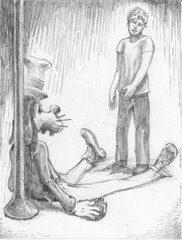Here children are taught that failure is the most they can hope for and that just about anything they do more competent than stepping in front of a car en route to the field, will result in lavish praise.
Little League of course, has its better known aspect, that of parents berating children for slandering their genes by striking out, fighting each other in the stands and abusing the umpire and players on the opposing team. To mitigate that image, sympathy has been planted at the core of the corporation.
In case a child does not feel bad about striking out, parents following the lead of the coaches will now show him that he should, by glorifying his shortcomings.
“Great swings,” a player hears as he returns to the dugout after striking out with no more threat to the ball than an ice cube to the climate of Death Valley. “Good job.” Now he knows he will receive attention and succor for striking out and government aid crawls to the horizon of his consciousness.
Ultimately the child sees that no one expects him to be able to hit the ball or succeed at anything in life and America’s place in the world drops infinitesimally.
I managed to avoid little league until fatherhood. If your kid would like to play some ball, he has to join because they’ve usurped all the ballfields and all the other kids. Gone are the days of the pick-up sand lot game. My eight year old boy, normally one of the better hitters, had strike five on him. Failing to grasp the desperation of my ancestry, I yelled, “You’re supposed to hit the ball.”
It was so politically incorrect and so naturally refreshing to hear a parent give his kid a little ribbing, that an involuntary chuckle burst from the bleachers. After strike six Sam walked back to the dugout trying to suppress a grin that showed he appreciated being the only kid not taken for a fool.
Little League has some stock phrases that you’ll hear more in one game than “uh” in a George W. press conference. “Baseball ready” is the most ironic, used to transfer the players’ gaze from a passing butterfly to events at the plate. The true meaning of course, is recline with beer in hand. My favorite is “Good eye.” This is used to encourage batters not to swing at bad pitches. And passing airplanes. The ball can be so far out of the strike zone that it can’t be seen and if the child refrains from swinging the bat just then, he will hear, without exception, “Good eye.”
Who knows what the tike is thinking when this happens or if he even knows what it’s supposed to convey. He may think the parents and coaches are complimenting themselves with “Good I.”
One coach ever ready to find something nice to say, was faced with the challenge as a seven year old swung and missed at six straight pitches, finally ending his at-bat. “Way to hang,” he came up with, though it sounded to me like he had resorted to rating the boy’s genitals.
The spread of Little League throughout the world is America’s best hope to survive its effects as civilization will climb backwards together with us at the top of the pile, albeit a lower one.
